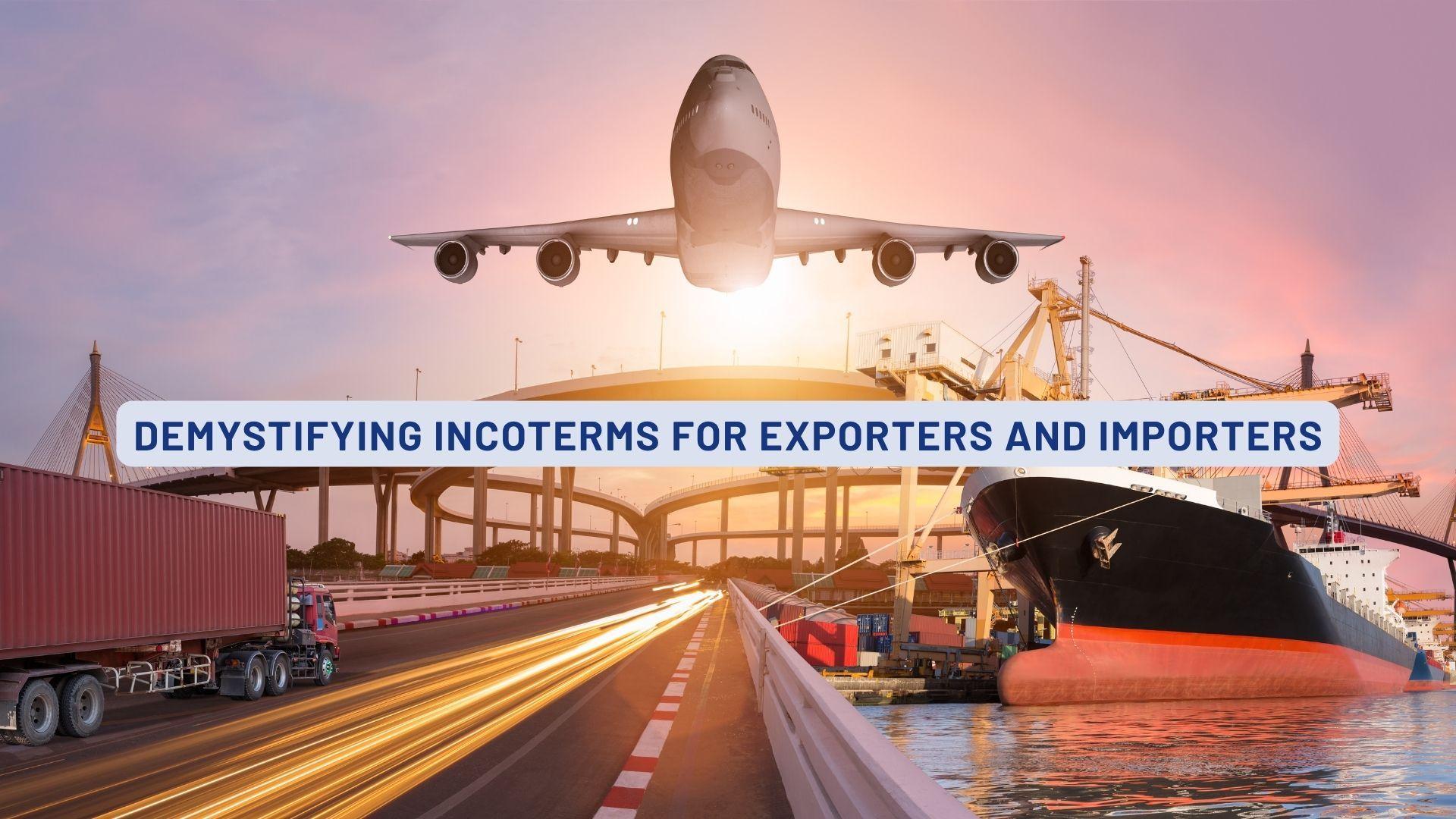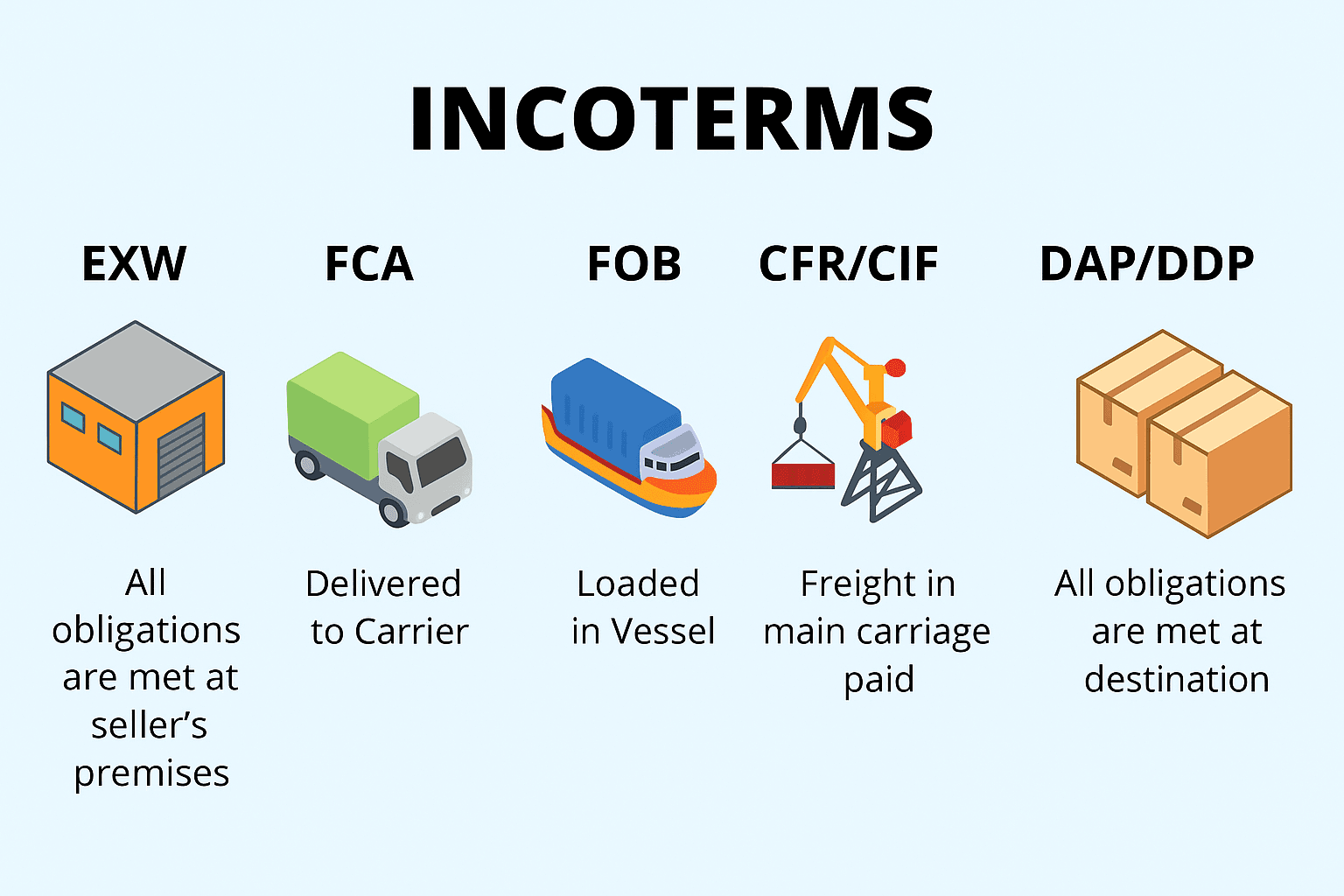
Demystifying INCOTERMS for Exporters and Importers: Your Complete Guide
Introduction: Why INCOTERMS Matter
If you're involved in international trade whether you're exporting handmade crafts from Nepal or importing industrial machinery from Europe you’ve likely come across a set of strange-looking abbreviations: EXW, FOB, CIF, DAP, and more.
These are called INCOTERMS (short for International Commercial Terms), and they play a massive role in shaping your responsibilities, costs, and risk as a buyer or seller in global trade.
But what do they actually mean? More importantly, how do you use them correctly?
In this post, we'll demystify INCOTERMS explaining what they are, why they matter, and how exporters and importers can make smarter logistics decisions with them.
What Are INCOTERMS?
INCOTERMS are a set of internationally accepted rules published by the International Chamber of Commerce (ICC). They were created to clearly define who (the buyer or the seller) is responsible for specific parts of the shipping process.
These rules:
- Clarify who pays for what (shipping, insurance, customs).
- Determine when risk transfers from the seller to the buyer.
- Standardize logistics roles so both parties are on the same page, even across countries.
The latest version INCOTERMS 2020, includes 11 terms, which are grouped into two categories: applicable to all modes of transport, or sea/inland waterways only.
Why Use INCOTERMS?
INCOTERMS help prevent misunderstandings and legal disputes by making contracts more specific.
Here's what they cover:
- Who organizes transport
- Who pays for logistics costs (e.g., freight, insurance)
- Where the goods change hands
- Who handles export/import customs clearance
INCOTERMS do not cover:
- Price of goods
- Method of payment
- Transfer of ownership/title
✅ Pro Tip: While INCOTERMS reduce ambiguity in contracts, they still need to be applied properly wrong usage can result in surprise costs, delays, or disputes.

The 11 INCOTERMS (2020 Edition) Explained
✅ Group 1: Used Across All Modes of Transport
1. EXW – Ex Works
- Seller's obligation ends: When goods are available at their premises (warehouse/factory).
- Buyer handles: All transport, customs, insurance.
- Best for: Buyers with local agents or freight forwarders.
🔧 Risks: Very little responsibility on the seller; high burden on the buyer, especially for first-time importers.
2. FCA – Free Carrier
- Seller delivers goods: To a carrier nominated by the buyer at a designated place.
- Buyer handles: Main carriage, insurance, and import.
- Best for: Multi-modal shipments (air, sea, rail).
3. CPT – Carriage Paid To
- Seller delivers goods + pays for main transport.
- Buyer takes on risk: After goods are handed to the first carrier.
- Best for: Exporters who want to control initial transport but limit liability.
4. CIP – Carriage and Insurance Paid To
- Same as CPT, but seller also provides insurance.
- Risk still transfers early to buyer, despite insurance.
✈️ Often used in air freight and courier shipments.
5. DAP – Delivered At Place
- Seller delivers goods to final destination city, ready for unloading.
- Buyer pays for: Import duties, unloading only.
- Ideal for: Offering complete delivery up to the buyer’s doorstep.
6. DPU – Delivered at Place Unloaded
- Seller delivers goods to final location and unloads them.
- Buyer pays only for: Import clearance and taxes.
- New in 2020: Replaced old DAT term.
7. DDP – Delivered Duty Paid
- Seller handles everything: transport, duties, import clearance.
- Very buyer-friendly but the seller may face unpredictable costs if not familiar with local regulations.
⚠️ Use cautiously when exporting to countries with complex customs.
✅ Group 2: Used Only for Sea and Inland Waterway Transport
8. FAS – Free Alongside Ship
- Seller delivers goods beside the vessel at the port.
- Buyer handles: Loading on vessel, freight, insurance.
9. FOB – Free On Board
- Seller loads goods onto vessel at the named port.
- Buyer assumes responsibility from that point on.
📦 Common in bulk shipping also one of the most misused terms in container shipping (which should use FCA instead).
10. CFR – Cost and Freight
- Seller pays for goods and freight to port of destination.
- Risk transfers once goods are loaded on the ship.
11. CIF – Cost, Insurance and Freight
- Same as CFR, but seller adds marine insurance.
- Buyers still assume risk early, despite the seller providing insurance.
A Real-World Example: Nepal to Europe Shipment
Let’s say you’re a Nepalese exporter shipping handcrafted textiles to a buyer in Germany.
- If you choose EXW Kathmandu, the buyer arranges the pickup and handles everything from Nepal to Germany.
- If you choose FCA Birgunj ICD, you deliver the goods to the buyer’s forwarder at Birgunj terminal.
- Choosing DAP Hamburg means you take care of the entire journey—including customs in Germany right up to the buyer's warehouse.
Each INCOTERM shifts not only responsibility but also cost implications, and choosing the wrong one for a shipment size or customer can seriously impact profitability or customer satisfaction.
Tips for Procurement and Export Professionals
✅ Always Specify the INCOTERM + Named Place
Good example: “CIP Tokyo International Airport, Japan (INCOTERMS® 2020)”
❌ Bad example: “CIP Tokyo” (Too vague could be port, warehouse, city center?)
✅ Include INCOTERMS in All Sales Contracts or Proforma Invoices
Leaving INCOTERMS out can lead to disputes when costs arise. Make them part of your formal agreement.
✅ Use the Right INCOTERM for the Mode of Transport
For container shipments, FCA is better than FOB, even though FOB is still commonly used incorrectly.
✅ Don’t Automatically Choose What Seems Cheapest
It might seem cheaper to go Ex Works (EXW), but hidden costs like export clearance and local handling can surprise your buyer and hurt future sales.
✅ Get Advice From Your Freight Forwarder
Experienced freight companies (like Sea Sky Cargo) can help you:
- Choose the right term.
- Estimate costs accurately.
- Ensure you comply with each party’s obligations.
Helpful Tools and Resources
Conclusion: INCOTERMS Are Your Global Trade Playbook
INCOTERMS are more than just shipping terms they’re global trade safety nets that help you minimize misunderstandings, control costs, and ensure smoother delivery timelines.
Whether you’re a first-time exporter or a seasoned procurement manager, getting the INCOTERM right can mean the difference between a profitable deal and a stressful shipment.
Before your next international shipment, take a moment to revisit your favorite INCOTERM. And if you’re ever unsure, don’t guess partner with an experienced freight forwarder to guide you through it.
Looking for an expert logistics partner to take the complexity out of international shipping? Sea Sky Cargo has helped hundreds of importers and exporters navigate freight, customs, and compliance delivering value, visibility, and peace of mind at every step.
Contact us today for a consultation.
